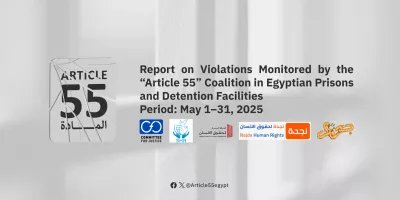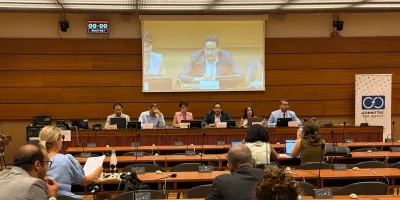The Committee for Justice (CFJ) has expressed strong condemnation of the recent issuance of an arrest warrant against Sihem Ben Sedrine, the former president of the Truth and Dignity Commission, calling for an end to the arbitrary actions against her. The committee emphasized that laws are meant to be the foundation of justice, to defend rights, and to uphold human dignity, not to be used as tools to silence those who dare to speak the truth or defend the rights of the oppressed. When justice turns into a weapon against dissidents, and the state shifts from protecting rights to violating them, it loses its moral and political legitimacy.
This statement comes after the first investigating judge at the Economic and Financial Judiciary Pole in Tunisia issued an arrest warrant against Sihem Ben Sedrine. The warrant, issued in early August, is based on a case related to a complaint filed by a former member of the commission regarding alleged falsification of the commission’s final report concerning the Tunisian state’s compensations related to the French-Tunisian Bank.
The Truth and Dignity Commission was established by a special law passed by the Tunisian parliament and was responsible for investigating human rights violations in Tunisia during the presidencies of Habib Bourguiba (1955–1987) and Zine El Abidine Ben Ali (1987–2011), and the two years following the 2011 revolution, up until the end of 2013. During this period, spanning nearly six decades, thousands of activists, including Islamists and leftists, were subjected to torture during long prison terms, in addition to the displacement of thousands more and the denial of their rights due to their opposition to the regime. Furthermore, at least 320 protesters were killed, and hundreds were injured during the 2011 Tunisian revolution.
The commission began its work on May 27, 2015, after establishing its executive body, setting up regional offices, and drafting its internal regulations. It managed to meet with civil society representatives across the country to determine ways to cooperate and agree on practical means to help uncover violations. By the time it concluded its work at the end of 2018, the commission had referred 72 indictments to the judiciary and had over 80 more pending investigations. It also submitted its final report to former President Beji Caid Essebsi in early January 2019.
Among the recommendations in the report were the necessary reforms to prevent the recurrence of human rights violations, the importance of compensating victims of such violations, and the protection of judicial accountability.
CFJ believes that the arbitrary measures against Sihem Ben Sedrine are part of the current Tunisian regime’s efforts to silence all free and opposing voices, dismantle intermediary institutions, and nullify the commission’s final report, which contains accusations against figures from the previous regime and aims to dismantle the country’s deep state and corruption network.
CFJ also considers these measures “illegal,” as they violate Article 96 of the Basic Law No. 53 of 2013, dated December 24, 2013, concerning the establishment and organization of transitional justice, which prohibits the prosecution of commission members based on the content of the final report.
Moreover, CFJ noted signs of repression facing the commission members and its president, pointing out the systematic obstruction by the judiciary, under executive authority, of nearly 205 cases referred by the commission, involving 1,500 individuals (including 1,200 affiliated with the Ministry of Interior) accused of serious violations such as premeditated murder, torture, enforced disappearance, and embezzlement of public funds.
In light of all this, CFJ condemns the targeted harassment of Sihem Ben Sedrine by the Tunisian regime and rejects all arbitrary measures taken against her, which appear to be linked to her work with the commission and calls for an immediate halt to these actions and the cancellation of the arrest warrant issued against her.






